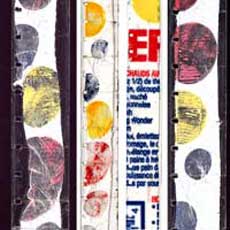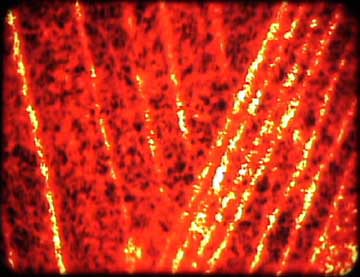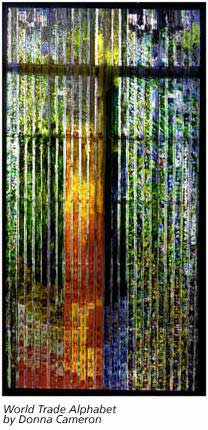An
insanematography show curated by Devon Damonte
in
person!
Suddenly cells of strange obsessive anarchist
film scratchers and painters are omnipresent. It's
a ding-dang DIY thumpin revolution in your town and
across the globe. Twas made historic at last fall's
Ottawa Animation Fest where a new category for "non-narrative"
film was introduced, and the festivities at this major
industry event began and ended with a "projector
orchestra" performing live to a giant scratch
film completed minutes before. In this here screening
you'll see kickass stuff done on site at Ottawa03
and also from 'Crackpot Crafter' workshops
in Southie, Olneyville, Waltham, Olympia, Seattle,
Eugene, and Telluride.
 |
Plus
new treats from genre giants across the continent,
and a closeup immersion in new stuff from once Bostonian
vagabond Devon Damonte, including:
WonderPain, BusterBalls, and FuckinGoofy.
And of course, Devon will have on hand raw film leaders
of various stripes and a plethora of Sharpies and
scratch-o-thingies for y'all to make yer own group
loop later.
Devon
Damonte is an independent experimental animator
who has been making films by hand without cameras
for the past 15 years. He also frequently teaches
workshops and lectures on direct animation. In other
incarnations, Damonte is the former program director
for Boston Film Video Foundation and has worked as
an arts administrator and programmer on both coasts.
His work have recently screened at exhibits in the
"Animations" show at PS 1 Contemporary Arts
Center in New York, and at the Telluride International
Experimental Cinema Exposition.
Direct
Animation is the technique of creating cinematic
images by working directly onto motion picture film
stock by hand, without using cameras. Various graphics
are set in motion by using the film material as a
vehicle for a moving "canvas." Techniques
may include (but aren't limited to) painting, scratching,
adhering thin semi-transparent materials to the film
with tape or glue, ironing to transfer inks from plastic,
and various other strange and obsessive methods not
recommended by the manufacture.
Program:
Snow
Flukes, 1.5 min, 16mm
Director: Courtney Hoskins (Brooklyn,
NY)
Snow Flukes was made from an Otto
Messmer “Felix the Cat” silhouette cartoon
that was at one time projected in Times Square. In
the days of courting my now husband, I would visit
his window in the snowy nights and invite him to dance.
The discovery of this footage was an instance of magic
in my life.
Light Magic 3.5 minutes, 16mm, 2001
Director:
Izabella Pruska-Oldenhoff (Toronto, Canada)
"Movies
arise out of magic." Stanley Cavell
Light
Magic utilizes and examines one of the earliest
photographic processes discovered at the birth of
the photographic medium, the photogram. This technique
combines science and art in order to record the process
of transformation. Images created through this technique
are traces of light that passes through each object
leaving its mark on the film surface. Photograms bring
both the maker and the viewer closer to the object,
thus revealing the essence, that neither the naked
eye could see, nor the camera lens could capture.
"While traditional narratives and moving images
representational of the human form will likely always
dominate our filmgoing experience, it is a mysterious
reality that co-existing with this traditional exposed
‘light' are its variations somewhere just outside
our viewfinder. This seems to be the kind of light
that Pruska-Oldenhof seeks to capture in Light Magic.
She uses the cameraless photogram technique to create
"a luminous dance", strangely hypnotic and
suggestive. Sound and image relate an unconventional
narrative but to a receptive viewer, perhaps also
an intriguing change of form and point of reference."
(Marcus Robinson, LIFT Newsletter, Mar./Apr. 2001)
Light Magic was one of the fifteen films commissioned
by the Liaison of Independent Filmmakers of Toronto
on the occasion of its 20th anniversary. The subject
and the aesthetic of this film are a response to the
statement "Self & Celluloid: The Future"
 |
Hoyas
De Maíz 11 minutes, 2002
Director:
Eric Theise (San Francisco)
A stunning and colourful 16mm film, completely hand-made
from soft ground etchings on Japanese silk paper of
impressions of the elaborate networks of veins from
corn husks used to form tamales.
The
Natural History of Harris Ave, Olneyville
Director: Johanna Dery (RI)
Plants found along my favorite street in my neighborhood.
by Olneyville, RI.
Pepper
Steak 3 minutes,16mm, 1984
Director: Steven Woloshen (Montreal,
Canada)
New
Film Loops!
Director: Sandra Gibson (NYC)
New
Film Loops!
Director: Luis Recoder (NYC)
Terra
incognito
Director: Stephanie Maxwell (Rochester,
NY)
New work!
Director: Richard Reeves
and The Quick Draw Animation Society
(Calgary, Canada)
The Quick Draw Animation Society
www.awn.com/qas
Quickdraw- the urgency to illustrate
ideas
Animation- to make alive with spirit
Society- a group of cultural, intellectual
people
Quickdraw Animation Society (QAS) was incorporated
as a non-profit society in 1984. QAS’s
mandate is to support and encourage the production
of innovative independent animation and to develop
the appreciation of all types of animation as a viable
artistic medium. The principles engaged in at QAS
are: inclusion, co-operation, active participation
by youth, and positive support and encouragement among
the members.
 |
World
Trade Alphabet
Director: Donna Cameron
(NY) 2001, 16FPS, silent, 6m
MATERIALS: OIL, CHARCOAL, INK ON PAPER EMULSION*,
ON 35MM FILM
Process: Film begins with primitive carving into handmade
paper emulsion of ancient cuneiform glyphs, evolves
into painting and drawing of glyphs, them floating
type, using digital print-out of helvetica type and
concludes with multi-material words: World Trade Alphabet.
PLEASE NOTE: NO "LETTRASET" WAS USED IN
THE MAKING OF THIS FILM: ALL HELVETICA TYPE AND IT'S
FILMIC FLOW WAS DESIGNED, KERNED AND DIGITALLY OFFSET
ACETATE BY THE FILMMAKER.
Theme: A Visual Meditation on the evolution of the
alphabet which we use, it's origins in ancient Phoenicia,
and the fact that it was invented as a shorthand from
360+ character cuneiform to better the efficiency
of communication in ancient international world trade.
Made at the MacDowell Colony. Purchase, 2001, the
Museum of Modern Art Film Archive. ExhibIted: Gulf
& Western Gallery, NYU, NY; Exit Art, The Third
World, NYC, NY; Anthology Film Archives; Art Vanguard
Gallery, NY.
